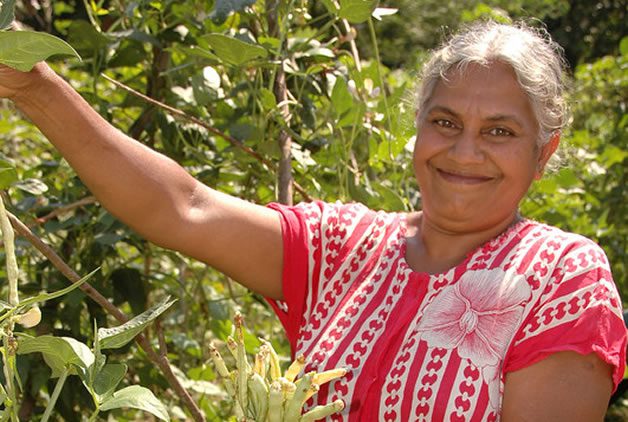
Somawathi Gunapala, from Pillanduwa village, in central Sri Lanka picks ripe snake beans from the vegetable garden she has established with four other community members, with Oxfam Australia’s support.
Environmentally friendly home gardens are helping poor families in Sri Lanka grow more food to eat and earn an income.
Quintos Andesinghe walks in from the garden, his face beaded with sweat, a warm toothy smile spread across his face. In his hands, he holds a metal dish piled high with freshly-picked vegetables — purple eggplants, bright green bitter melons and long yellow snake-beans.
“We don’t buy any vegetables from the shops now,” he says. “All our vegetable needs are met right here in our garden. If we have any extra, we sell them. Our life has improved.”
Quintos is one of five community members from Pillanduwa village, near Kegalle, in central Sri Lanka, who have joined forces to establish a model home garden with the training and support of Oxfam Australia partner Development Communication Foundation.
Group member Somawathi Gunapala says that members divide the harvested vegetables evenly between them for home consumption and then sell any extra to make a small income.
“I take [any excess vegetables] to the market fair and sell them. We also have regular customers who come and buy them from us because it is organic, poison-free food. There is a doctor who lives in the village and he comes and buys from us here,” Somawathi says.
“Monthly we will get an income of approximately 3,000–4,000 rupees (AUD $32–$42). Then we divide it between all the group members.”
The garden program
Nestled in the hills of Warakapola, in the central province of Sri Lanka, are some of the poorest people in the country. People here battle deforestation and soil erosion, water shortages and infertile soil. For many, growing enough food to eat has been a daily challenge. Yet, with nowhere else to go, they must find a way to survive, regenerate their land and live free from poverty and exploitation.
Oxfam Australia has been supporting the Development Communication Foundation’s (DCF) Garden Program for more than ten years. The local organisation works with women and men in the poorest villages of Warakapola to develop thriving home gardens.
The garden program:
- reduces day-to-day food expenses
- ensures there is more food to eat
- promotes good health and nutrition
The program trains women and men in good gardening techniques like:
- using less water and increasing soil fertility
- creating better garden designs for small spaces
- recycling garden materials
- saving traditional seed varieties
Who benefits?
The program mainly supports women who are responsible for making sure there is enough food for their children, but lots of men benefit too. Participants learn how to grow traditional local vegetables, fruits and herbs using environmentally-friendly gardening techniques. As well as receiving start-up seeds and plants, they are taught how to create small kitchen gardens using coconut husks, plastic sheeting, plant waste, animal manure and compost. Other important techniques are emphasised, like making organic fertiliser and chemical-free pesticides. This training is combined with education in better rainwater-harvesting techniques, food processing and good nutrition, as well as support to build wells and access local markets so they can sell any excess produce.
So far more than 5,000 families across Sri Lanka have been involved in the home gardening program, with more than 80% going on to start home gardens.
Simple solutions
DCF trainer Dipika Priyadarshini says that the home gardens are placed next to the home so that kitchen waste such as rice water, vegetable scraps, waste water and cooking ash can be composted in the garden.
“These gardens don’t need too much labour — family labour can be used and with minimal expenses,” Dipika explains. “Then, when family members see the garden growing so well, everyone gets the incentive and encouragement to work on it, even the children.
“This method of home gardening is particularly good for places where there is less water or a lot of stones. It helps to make the soil more fertile.”
Fellow group member Piyatha Nandasena says the home gardens had improved the lives of many community members who normally relied on irregular and low-paying work as rubber-tree tappers.
“Before we had home gardens, we didn’t have that many vegetables to eat,” Piyatha says. “Now we get our vegetables from the home garden… We spend less money on food, have a large quantity of vegetables to eat and excess to sell… We are healthier.”
Find out more
- Learn more about our food and nutrition work
- Learn more about our work in Sri Lanka